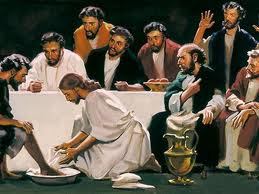
While substituting in a fourth-grade class, I noticed that there was no recycling bin. So, I challenged the class to set up an “environmental committee” to do something about this. Immediately several hands went up to volunteer. When the “committee” came together, one girl quickly yelled out, “I’m president.” Another followed with “I’m vice-president,” then came “I’m secretary,” “I’m treasurer.” Little Zach, the only boy in the group, was not as quick to speak up, so he sat there “position-less.” When the noise died down, he spoke up and said, “I’m the CEO.”
We are all as little children who like to have positions in life to make us feel important—a little higher up the ladder than the rest of the group. While this shuffling for positions may seem humorous among children, it can be destructive in the Christian community. Jesus warned us about this (Matthew 23:1-12).
“The scribes and the Pharisees have taken their seat on the chair of Moses. Therefore, do and observe all things whatsoever they tell you, but do not follow their example. For they preach but they do not practice. They tie up heavy burdens hard to carry and lay them on people’s shoulders, but they will not lift a finger to move them. All their works are performed to be seen.”
Jesus used the scribes and Pharisees as “counter examples.” While their position was to be honored, their example was to be avoided. They seemed to know all the answers, but they weren’t good at living the answers. Their sense of importance was tied in with their titles rather than their relationship with God.
“They love…greetings in marketplaces, and the salutation ‘Rabbi.’ As for you, do not be called ‘Rabbi.’ You have but one teacher and you are all brothers. Call no one on earth your father; you have one Father in heaven. Do not be called ‘Master’; you have been one Master, the Christ.”
Being brothers and sisters in God’s family was more important than bearing titles that seem to honor one person more than another. All members of the community were to be honored as much as the leaders in the community. Titles and positions, of course, are necessary—would we expect a child to call his father “Joe” or “Dad”—but they are not to create a system that makes one person seem more important than the other.
“The greatest among you must be your servant.”
Those who bear titles of authority are to be the “foot washers” and the servants at dinner. They are to identify with the lowliest persons in a group, rather than be seen as dignitaries who need to be served.
Jesus concluded with,
“Whoever exalts himself will be humbled; but whoever humbles himself will be exalted.”
Humility! Isn’t that what Jesus is calling us to? Humility does not mean that we degrade ourselves or see ourselves less than others. Humility means we realize how important we are, not because of a title we bear or the degrees after our names, but because of who we are—adopted children of the living God! He who is mighty has done great things for us. We honor one another because we see in each other a chosen son or daughter of God. Having been baptized into Christ we are new creations, members of the greatest organization on earth—the Body of Jesus Christ. Our bodies are temples of the Holy Spirit. What are “titles” compared to who we really are in Christ?
